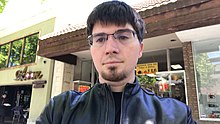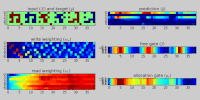Ian Goodfellow
Ian Goodfellow | |
|---|---|
 | |
| Born | 1985/1986 (age 35–36) |
| Nationality | American |
| Alma mater | Stanford University Université de Montréal |
| Known for | Generative adversarial networks, |
| Scientific career | |
| Fields | Computer science |
| Institutions | Apple Inc. Google Brain OpenAI |
| Thesis | Deep Learning of Representations and its Application to Computer Vision (2014) |
| Doctoral advisor | Yoshua Bengio |
| Website | www |
Ian J. Goodfellow[1] (born 1985 or 1986) is a researcher working in machine learning, currently employed at Apple Inc. as its director of machine learning in the Special Projects Group.[2] He was previously employed as a research scientist at Google Brain and has made several contributions to the field of deep learning. Goodfellow wrote the chapter on deep learning in the most popular textbook in the field of artificial intelligence: Artificial Intelligence: A Modern Approach used in more than 1,500 universities in 135 countries as well as the textbook Deep Learning.
Biography[]
Goodfellow obtained his B.S. and M.S. in computer science from Stanford University under the supervision of Andrew Ng,[3] and his Ph.D. in machine learning from the Université de Montréal in April 2014, under the supervision of Yoshua Bengio and Aaron Courville. His thesis is titled "Deep learning of representations and its application to computer vision".[4][5] After graduation, Goodfellow joined Google as part of the Google Brain research team.[6] He then left Google to join the newly founded OpenAI institute.[7][8] He returned to Google Research in March 2017.
Goodfellow is best known for inventing generative adversarial networks.[1] He is also the lead author of the textbook Deep Learning.[9] At Google, he developed a system enabling Google Maps to automatically transcribe addresses from photos taken by Street View cars[10][11] and demonstrated security vulnerabilities of machine learning systems.[12][13]
In 2017, Goodfellow was cited in MIT Technology Review's 35 Innovators Under 35.[14] In 2019, he was included in Foreign Policy's list of 100 Global Thinkers.[15]
In 2019 Goodfellow left Google and joined Apple Inc. as director of machine learning.[16]
References[]
- ^ Jump up to: a b Goodfellow, Ian J.; Pouget-Abadie, Jean; Mirza, Mehdi; Xu, Bing; Warde-Farley, David; Ozair, Sherjil; Courville, Aaron; Bengio, Yoshua (2014). "Generative Adversarial Networks". arXiv:1406.2661 [stat.ML].
- ^ Novet, Jordan (2019-04-04). "Apple hires AI expert Ian Goodfellow from Google". www.cnbc.com. Retrieved 2019-04-05.
- ^ Ng, Andrew. "Curriculum Vitae--Andrew Y. Ng" (PDF).
- ^ https://pdfs.semanticscholar.org/f78e/6ab39c67b1fcdf6d77f7b25dcff3e094ce24.pdf
- ^ "PhD defense thesis of Ian Goodfelow". Universite de Montreal. Retrieved 27 October 2020.
- ^ "Ian Goodfellow". Research at Google. Archived from the original on August 14, 2016. Retrieved July 31, 2016.
- ^ Brockman, Greg (March 31, 2016). "Team++". OpenAI Blog. Retrieved July 31, 2016.
- ^ Metz, Cade (April 27, 2016). "Inside OpenAI, Elon Musk's Wild Plan to Set Artificial Intelligence Free". Wired. Retrieved July 31, 2016.
- ^ Goodfellow, Ian; Bengio, Yoshua; Courville, Aaron (2016). Deep Learning. Cambridge, Massachusetts: MIT Press.
- ^ "How Google Cracked House Number Identification in Street View". MIT Technology Review. January 6, 2014. Retrieved July 31, 2016.
- ^ "Updating Google Maps with Deep Learning and Street View". Research Blog. Retrieved 2017-05-04.
- ^ Gershgorn, Dave. "Fooling the Machine". Popular Science. Retrieved July 31, 2016.
- ^ Gershgorn, Dave (July 27, 2016). "Researchers Have Successfully Tricked A.I. Into Seeing The Wrong Things". Popular Science. Retrieved July 31, 2016.
- ^ "Ian Goodfellow, 31".
- ^ "2019 Global Thinkers".
- ^ "Ian Goodfellow, Linkedin".
- American computer scientists
- Artificial intelligence researchers
- Google employees
- Living people
- Machine learning researchers
- People from San Francisco
- Stanford University School of Engineering alumni
- Université de Montréal alumni
- 1980s births
- Apple Inc. employees
- Computer scientist stubs
